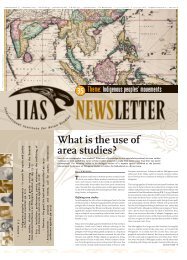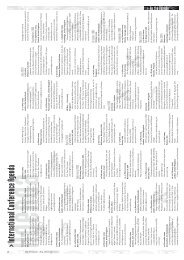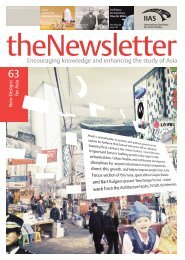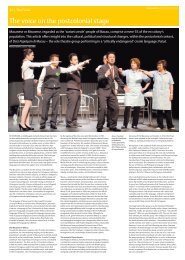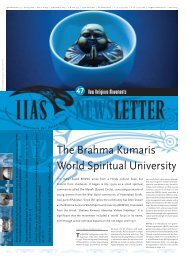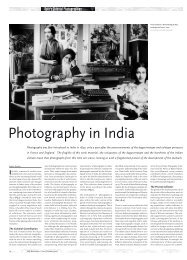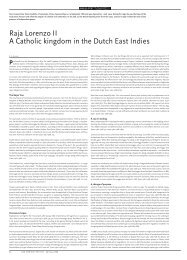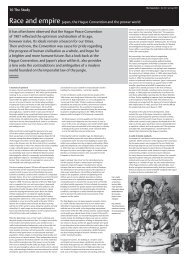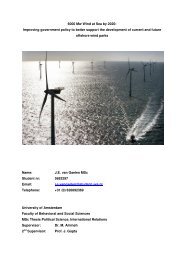Sex, love and revolution - IIAS
Sex, love and revolution - IIAS
Sex, love and revolution - IIAS
Create successful ePaper yourself
Turn your PDF publications into a flip-book with our unique Google optimized e-Paper software.
I I A S R E S E A R C H<br />
<strong>IIAS</strong> Research<br />
Programmes<br />
NEW! Science <strong>and</strong> History in Asia<br />
The complex links between science <strong>and</strong> history in Asian civilisations can be<br />
studied on at least two levels. First, one can focus on the ways in which the<br />
actors have perceived those links; how, on the one h<strong>and</strong>, they have used<br />
disciplines that we now categorise as sciences, such as astronomy, for a<br />
better underst<strong>and</strong>ing of their own past; <strong>and</strong>, on the other h<strong>and</strong>, how they<br />
have constructed the historicity of these disciplines, giving them cultural<br />
legitimacy. Secondly, one can reflect on historiographical issues related to<br />
the sciences. How can the sciences be incorporated into historical narratives<br />
of Asian civilisations? This question is crucial, given the dominant<br />
19th <strong>and</strong> 20th century view that science is a European invention, <strong>and</strong> that<br />
it has somehow failed to develop endogenously in Asia, where “traditional<br />
science” is usually taken as opposed to “Western” or “modern science”.<br />
This project will address various approaches to the issue by organising five<br />
international workshops in Cambridge, Leiden <strong>and</strong> Paris.<br />
Sponsored by: NWO Humanities, Needham Research Institute, Recherches<br />
Epistémologiques et Historiques sur les Sciences Exactes et les Insitutions<br />
Scientifiques (REHSEIS), <strong>and</strong> <strong>IIAS</strong><br />
Coordinators: Prof. Christopher Cullen (Needham Research Institute)<br />
<strong>and</strong> Prof. Harm Beukers (Scaliger Institute, Leiden University)<br />
Asia Design<br />
This programme consists of a number of individual projects related to<br />
graphic design - from classical graphics in art <strong>and</strong> communication to the<br />
rapidly emerging fields of cyberculture (New Media, videogames, etc.)<br />
<strong>and</strong> animanga (anime <strong>and</strong> manga) in East Asia - <strong>and</strong> architectural design<br />
in Asian megacities. The projects address both the physical <strong>and</strong> social<br />
aspects of design.<br />
Asia. The second component looks at the experiences of female migrants<br />
in the context of the first component. To investigate these issues, this<br />
project will bring together scholars who have already been working on<br />
related topics. A three-year research project is developed with an empirical<br />
focus on Taiwan <strong>and</strong> South Korea as the receiving countries, <strong>and</strong> Vietnam<br />
<strong>and</strong> the PRC as the sending countries.<br />
Coordinators: Dr Melody LU (<strong>IIAS</strong>) m.lu@let.leidenuniv.nl<br />
Prof. WANG Hongzhen (Graduate School of Sociology, National Sun<br />
Yat-Sen University, Kaoshiung, Taiwan)<br />
Illegal but licit: transnational flows <strong>and</strong> permissive<br />
polities in Asia - IBL<br />
This research programme analyses forms of globalisation-from-below,<br />
transnational practices considered acceptable (licit) by participants but<br />
which are often illegal in a formal sense. It explores limitations of ‘seeing<br />
like a state’, <strong>and</strong> instead privileges the perspectives of participants in<br />
these illegal but licit transnational flows.<br />
Sponsored by: NWO <strong>and</strong> ASiA<br />
Coordinator: Willem van Schendel<br />
h.w.vanschendel@uva.nl<br />
Socio-genetic marginalization in Asia - SMAP<br />
The development <strong>and</strong> application of new biomedical <strong>and</strong> genetic technologies<br />
have important socio-political implications. This NOW/ASSR/<strong>IIAS</strong><br />
research programme aims to gain insight into the ways in which the use<br />
of <strong>and</strong> monopoly over genetic information shape <strong>and</strong> influence population<br />
policies, environmental ethics <strong>and</strong> biomedical <strong>and</strong> agricultural practices<br />
in various Asian religious <strong>and</strong> secular cultures <strong>and</strong> across national<br />
boundaries.<br />
Sponsored by: NWO, <strong>IIAS</strong>, ASSR<br />
Important Announcement:<br />
Schedule Change<br />
Asia- Europe<br />
Workshop Series 2010<br />
Every year, the Asia-Europe Foundation (ASEF) in Singapore <strong>and</strong><br />
the European Alliance for Asian Studies (secretariat at <strong>IIAS</strong>) in<br />
Leiden organise the Asia-Europe Workshop Series.<br />
This grant scheme provides six workshop conveners with a subsidy<br />
of € 12,500 to organise an academic workshop with European<br />
<strong>and</strong> Asian participants from ASEM countries, dealing with themes<br />
of common interest.<br />
The next scheme will be applied to the calendar year 2010.<br />
The European Alliance for Asian Studies <strong>and</strong> the Asia-Europe<br />
Foundation welcome proposals for workshops in 2009, to take<br />
place in 2010.<br />
Important dates:<br />
January 2009<br />
Announcement “Call for Proposals”<br />
Online application form ready for use<br />
1 July 2009<br />
Deadline for sending in workshop proposals<br />
For detailed information on the Asia-Europe Workshop Series<br />
2010 scheme, please check our website www.iias.nl or contact<br />
our secretariat at iias@let.leidenuniv.nl / +31 71 527 2227.<br />
Institutes involved: <strong>IIAS</strong>, Modern East Asia Research Centre (MEARC),<br />
Delft School of Design (DSD)<br />
Coordinator: Margaret Sleeboom-Faulkner<br />
m.sleeboom-faulkner@sussex.ac.uk<br />
Sponsored by: <strong>IIAS</strong> <strong>and</strong> Asiascape<br />
Coordinators: Prof. Chris Goto-Jones <strong>and</strong> Dr Manon Osseweijer<br />
c.goto-jones@let.leidenuniv.nl<br />
m.osseweijer@let.leidenuniv.nl<br />
Catalogue of Sanksrit manuscripts<br />
In 1929, two crates of 17th <strong>and</strong> 18th century Sanskrit manuscripts arrived<br />
at the Kern Institute, University of Leiden. This Gonda/<strong>IIAS</strong> project is preparing<br />
a scientific catalogue of the roughly 500 South Indian Sanskrit manuscripts<br />
written on palm leaves in ancient Indian scripts such as Grantha,<br />
Telugu, Malayalam, Nagari <strong>and</strong> N<strong>and</strong>inagari.<br />
Coordinator: Saraju Rath<br />
s.rath@let.leidenuniv.nl<br />
Energy Programme Asia - EPA<br />
Established in September 2007, this programme addresses the domestic<br />
<strong>and</strong> geopolitical aspects of energy security for China <strong>and</strong> the European<br />
Union.<br />
The geopolitical aspects involve analysing the effects of competition for<br />
access to oil <strong>and</strong> gas resources <strong>and</strong> the security of energy supply among<br />
the main global consumer countries of the EU <strong>and</strong> China. The domestic<br />
aspects involve analysing domestic energy dem<strong>and</strong> <strong>and</strong> supply, energy<br />
efficiency policies, <strong>and</strong> the deployment of renewable energy resources.<br />
Within this programme scholars from the Netherl<strong>and</strong>s <strong>and</strong> China will visit<br />
each other’s institutes <strong>and</strong> will jointly publish their research outcomes.<br />
Institutes involved: Institute of West Asian <strong>and</strong> African Studies (IWAAS) of<br />
the Chinese Academy of Social Sciences (CASS)<br />
Sponsored by: KNAW China Exchange Programme <strong>and</strong> <strong>IIAS</strong><br />
Coordinator: Dr Mehdi Parvizi Amineh<br />
m.p.amineh@uva.nl<br />
Gender, migration <strong>and</strong> family in East <strong>and</strong> Southeast<br />
Asia<br />
Developed from an earlier research project on ‘Cross-border Marriages’,<br />
this project is a comparative study on intra-regional flows of migration<br />
in East <strong>and</strong> Southeast Asia with a focus on gender <strong>and</strong> family. It aims at<br />
studying the linkage between immigration regimes, transnational families<br />
<strong>and</strong> migrants’ experiences.<br />
The first component of the project looks at the development of the immigration<br />
regimes of the newly industrialised countries in East <strong>and</strong> Southeast<br />
Searching for sustainability in Eastern Indonesian<br />
waters<br />
The threat of biodiversity depletion calls for the establishment of Marine<br />
Protected Areas (MPAs), especially in rich natural environments like<br />
the marine space of eastern Indonesia. Most approaches to the establishment<br />
of MPAs, however, are science-based. Several interconnected<br />
developments dem<strong>and</strong> a constructive analysis of the societal impacts of a<br />
predominantly technical <strong>and</strong> science oriented approach to the establishment<br />
of MPAs around the world.This new programme focuses on MPAs<br />
in eastern Indonesia (Wakatobi, Komodo, Derawan, Raja Ampat) <strong>and</strong><br />
will facilitate the exchange of Dutch,Indonesian, German <strong>and</strong> Austrlian<br />
researchers. The aims of the programme are to (1) engage in a methodological<br />
training workshop for the three Indonesian partners plus six<br />
of their colleagues/staff members <strong>and</strong> (2) to collectively write a research<br />
proposal (2009-2013) on the social-economic <strong>and</strong> governance conditions<br />
of Marine Protected Area development.<br />
Sponsored by: KNAW, <strong>IIAS</strong>, Wageningen University, Australian Research<br />
Council, Center for Tropical Marine Ecology Bremen (ZMT), Germany<br />
Partner institutes: Wageningen University, Indonesian Institute of Sciences<br />
(LIPI), Bogor Agricultural University (IPB), The Nature Conservancy,<br />
Murdoch University (Perth, Australia), ZMT (Bremen, Germany)<br />
Coordinators: Prof. Leontine Visser (WUR/<strong>IIAS</strong>) <strong>and</strong><br />
Dr Manon Osseweijer (<strong>IIAS</strong>)<br />
m.osseweijer@let.leidenuniv.nl<br />
Networks<br />
Ageing in Asia <strong>and</strong> Europe<br />
During the 21st century it is projected that there will be more than one<br />
billion people aged 60 <strong>and</strong> over, with this figure climbing to nearly two billion<br />
by 2050, three-quarters of whom will live in the developing world. The<br />
bulk of the ageing population will reside in Asia. Ageing in Asia is attributable<br />
to the marked decline in fertility shown over the last 40 years <strong>and</strong><br />
the steady increase in life-expectancy. In Western Europe, ageing populations<br />
developed at a slower pace <strong>and</strong> could initially be incorporated into<br />
welfare policy provisions. Currently governments are seeking ways to trim<br />
<strong>and</strong> reduce government financed social welfare <strong>and</strong> health-care, including<br />
pensions systems, unleashing substantial public debate <strong>and</strong> insecurity.<br />
Many Asian governments are facing comparable challenges <strong>and</strong> dilemmas,<br />
involving both the state <strong>and</strong> the family, but are confronted with a<br />
much shorter time-span. This research programme, in short, sheds light<br />
For details: www.iias.nl<br />
on how both Asian <strong>and</strong> European nations are reviewing the social contract<br />
with their citizens.<br />
Research network involved: Réseau de Recherche Internationale sur<br />
l’Age, la Citoyenneté et l’Intégration Socio-économique (REIACTIS)<br />
Sponsored by: <strong>IIAS</strong><br />
Coordinator: Prof. Carla Risseeuw<br />
c.risseeuw@let.leidenuniv.nl<br />
ABIA South <strong>and</strong> Southeast Asian art <strong>and</strong> archaeology<br />
index<br />
The Annual Bibliography of Indina Archaeology is an annotated bibliographic<br />
database for publications covering South <strong>and</strong> Southeast Asian art<br />
<strong>and</strong> archaeology. The project was launched by <strong>IIAS</strong> in 1997 <strong>and</strong> is currently<br />
coordinated by the Postgraduate Institute of Archaeology of the University<br />
of Kelaniya, Colombo, Sri Lanka. The database is freely accessible at www.<br />
abia.net. Extracts from the database are also available as bibliographies,<br />
published in a series by Brill. The project receives scientific support from<br />
UNESCO.<br />
Coordinators: Ellen Raven <strong>and</strong> Gerda Theuns-de Boer<br />
e.m.raven@let.leidenuniv.nl<br />
www.abia.net<br />
Islam in Indonesia: the dissemination of religious<br />
authority in the 20th <strong>and</strong> early 21st centuries<br />
Forms <strong>and</strong> transformations of religious authority among the Indonesian<br />
Muslim community are the focus of this research programme. The term<br />
authority relates to persons <strong>and</strong> books as well as various other forms of<br />
written <strong>and</strong> non-written references. Special attention is paid to the production,<br />
reproduction <strong>and</strong> dissemination of religious authority in the fields<br />
of four sub-programmes: ulama (religious scholars) <strong>and</strong> fatwas; tarekat<br />
(mystical orders); dakwah (propogation of the faith); <strong>and</strong> education.<br />
Coordinator: Nico Kaptein<br />
n.j.g.kaptein@let.leidenuniv.nl<br />
4 4 I I A S N E W S L E T T E R # 4 8 S u m m e r 2 0 0 8



